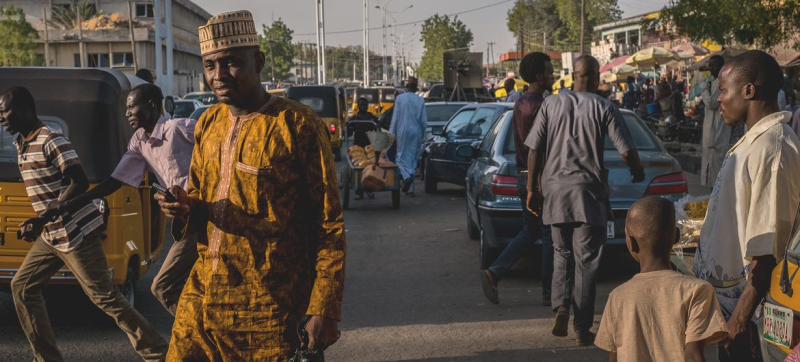- US seeks to befriend Jamaat-e-Islami, reports Washington Post |
- Tarique urges people to help restart democracy, elected reps solve problems |
- $1 for Nature, $30 for Its Destruction: UN Warns |
- Madhyanagar Upazila in limbo four years after formation |
- BNP leader injured in gun shot in Keraniganj |
UN Rights Chief Condemns Global Glorification of Violence

Jihadist group Boko Haram which kidnapped schoolgirls in Chibok, Nigeria, in 2014, are part of resurgent violence in the country that has affected communities in and around Maiduguri (pictured).
UN rights chief Volker Türk on Monday condemned what he called a worldwide “glorification of violence” currently underway, as well as “coordinated efforts” to undermine fundamental human rights. “It is time for States to wake up and act,” he insisted.
“No one is safe when human rights are under attack,” Mr. Türk told the Human Rights Council, warning that the rules of war “are being shredded.”
“Some States are becoming an extension of their ruler’s personal power,” he added.
In his customary address at the UN’s top rights forum at the start of a new session in Geneva, the High Commissioner for Human Rights decried that “pro-war propaganda is everywhere,” from military parades to “ramped-up rhetoric” from leaders.
“Sadly, there are no peace parades or ministries of peace,” he stressed, calling for countries to stand firm against the growing “erosion” of international law.
He also emphasised the importance of multilateral accords as “the foundation of peace, our global order, and our daily lives, from trade rules to the global internet, to our fundamental rights.”
Today, governments “are disregarding, disrespecting, and disengaging” from the existing rules-based world order established after 1945 to prevent another world war, the UN rights chief said, calling for accountability.
The danger is that when States ignore violations of the law, “they become normalised,” Mr. Türk said. “When States apply the law inconsistently, they undermine the legal order everywhere. It is time for States to wake up and act.”
He condemned the continued illegal detention of UN staff in Yemen as a “direct attack on the UN system” and called the United States’ withdrawal “from the Paris Agreement and from global bodies, including this Council…deeply regrettable,” noting that other States were following suit.
The High Commissioner also warned about the negative consequences of Estonia, Finland, Latvia, Lithuania, and Poland leaving the Ottawa Treaty on land mines, while noting a “new trend of disparaging” the 2030 Agenda for Sustainable Development, agreed upon a decade ago.
As usual at the start of Council sessions, the High Commissioner highlighted situations of concern worldwide: Afghanistan, where women and girls’ participation in public life “is almost completely erased”; Haiti, “plunging deeper into lawlessness”; Nigeria, witnessing a resurgence of Boko Haram; and Syria, where the transition to peace remains “fragile.”
In Ukraine, following the largest drone assault of the conflict, Russia’s full-scale invasion “has turned even more deadly.”
In Sudan, besieged El Fasher is under constant bombardment, while in Myanmar, four years after the military coup, people remain caught in “a harrowing human rights calamity.”
In the eastern Democratic Republic of the Congo, “damning evidence” indicates continued “grave violations and abuses” by all parties, and Gaza is now a “graveyard” amid Israel’s “mass killing” of Palestinian civilians.
Where are steps to stop Gaza genocide?
“We are failing the people of Gaza…Where are the decisive steps to prevent genocide?” he asked. “Why are countries not doing more to avert atrocity crimes? They must stop the flow of arms to Israel that risk violating the laws of war.”
Mr. Türk also noted that progress to protect the rights of Uyghur and other Muslim minorities in China “has yet to materialise.”
In West Africa, restrictions on LGBTQ+ people are growing in some countries considering criminalising consensual same-sex relations, while the rights of migrants and refugees are increasingly violated.
“Iran and Pakistan have forcibly returned millions of Afghans, and India has deported groups of Rohingya Muslims by land and sea,” he said.
Similarly, Germany, Greece, Hungary, and other European countries “have also sought to limit the right to seek asylum.” He noted concerns about the US agreement with El Salvador, South Sudan, Eswatini, Rwanda, and others to deport third-country nationals and underlined Kuwait’s decision to revoke citizenship for thousands, “leaving many stateless.”
Poll appeal
On imminent national elections across Africa, Mr. Türk cited concerns over polling preparations in Cameroon, Côte d’Ivoire, Guinea, Guinea-Bissau, Malawi, Tanzania, and Uganda.
“In many of these countries, authorities are harassing, excluding, or detaining opposition leaders; restricting media freedom; banning peaceful protest; and cracking down on human rights defenders,” he said.
He urged Ethiopian authorities to ensure free, fair, and inclusive elections amid concerns about arbitrary journalist detentions.
As part of UN efforts to promote human rights, Mr. Türk urged all countries to ensure that “every child – whether a future farmer, digital worker, doctor, or shopkeeper – understands that human rights are our birthright.”
He added: “The vast majority of people around the world are crying out for human rights and freedoms…No one is safe when human rights are under attack. Abuses against one group are always part of a broader pattern of oppression and lead to wider erosion of fundamental freedoms.”

